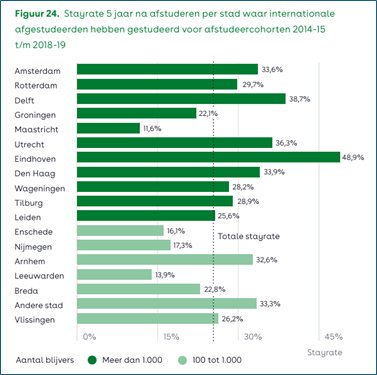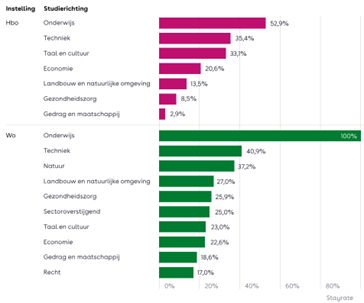International students are increasingly staying in the Netherlands to work
-
 Introductiefestival van 2024. Foto ter illustratie. Fotograaf: Johannes Fiebig
Introductiefestival van 2024. Foto ter illustratie. Fotograaf: Johannes Fiebig
Roughly 30 percent of international graduates still live in the Netherlands five years after graduation, which is more than in previous years. A significant number opt to stay here after graduating in Eindhoven in particular.
International students do not rush to leave once they complete their degree, with more than half remaining in the Netherlands one year after graduating, according to a new report by Nuffic, the Dutch organisation for internationalisation in education.
This plays an important role in the political debate over the internationalisation of higher education: the longer international students remain working in this country, the greater the economic benefits.
More likely to stay
While the majority leave over time, an increasing number of international students are choosing to stay. More than 30 percent of the 2018/19 graduates were still here five years later (in 2024), and this percentage is likely to be higher for subsequent cohorts.

This trend is probably driven by the tight labour market, but there is also another factor at play: researchers now have a better insight into international students. According to Nuffic, they are more likely to be registered in the Municipal Personal Records Database (BRP), making it easier to track them. If this is accurate, the stayrate was previously underestimated.
Where they studied is important. International graduates from Eindhoven University or another institution in the region in particular have a high stayrate, with 49 percent still being in the Netherlands after five years. In Delft, this figure is 39 percent. This data includes students in higher professional education and research-oriented higher education in these cities.

Students’ country of origin significantly influences their likelihood of staying. While many students from Germany choose to study in the Netherlands, they often leave once their studies are completed. Among European students, 20 percent remain here for over five years. For non-European students, this figure is twice as high. Students from Suriname (79 percent) and Iran (71 percent) in particular are the most likely to stay in this country after graduating.
The difference between universities of applied sciences and research universities does not seem to be a determining factor. Research university graduates are only one percentage point more likely to stay.
Teachers
The chosen field of study is a more important factor. International students in teacher training programmes typically remain in the Netherlands, while all research university graduates in the field do so. However, international students tend not to choose this field of study.

Economics students typically leave the country after graduation, yet their large numbers mean those who stay still form a substantial group. Science and engineering students remain almost twice as often, although their numbers are comparatively smaller.
Many international graduates work in Amsterdam and the surrounding area (37 percent), or find jobs near Rotterdam, The Hague, Delft, Utrecht or Eindhoven.
Translation: Taalcentrum-VU.



